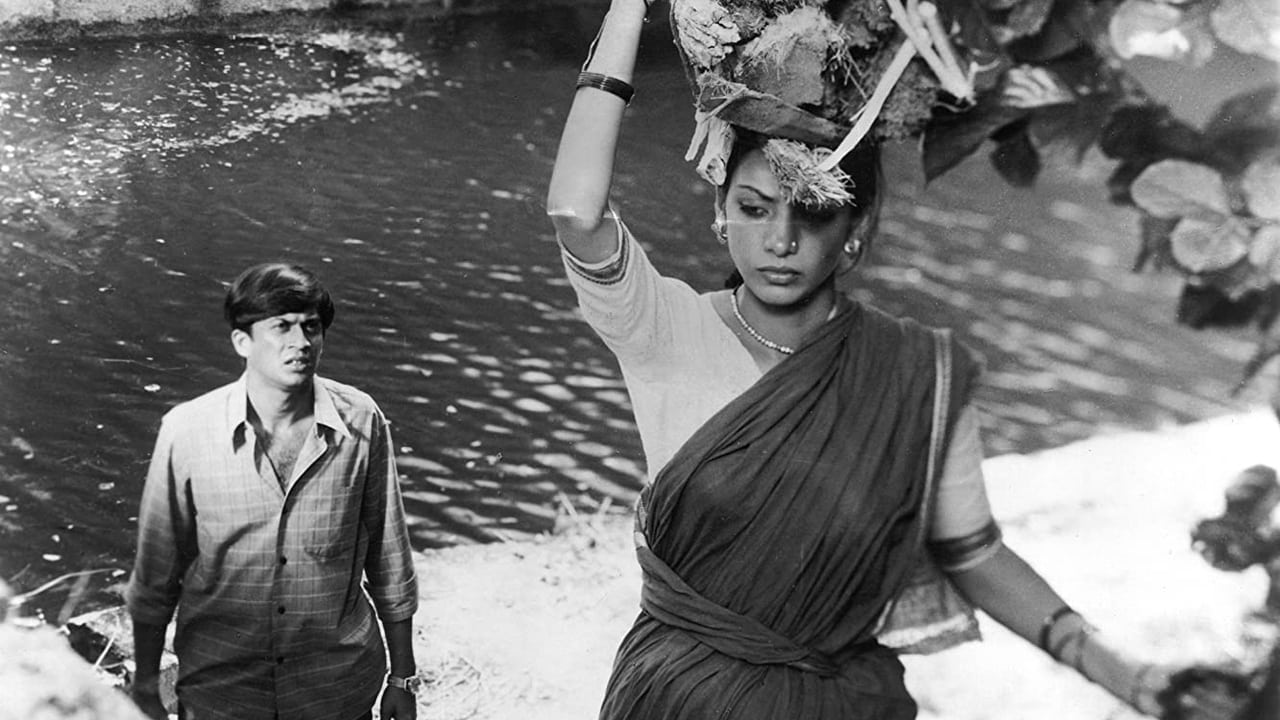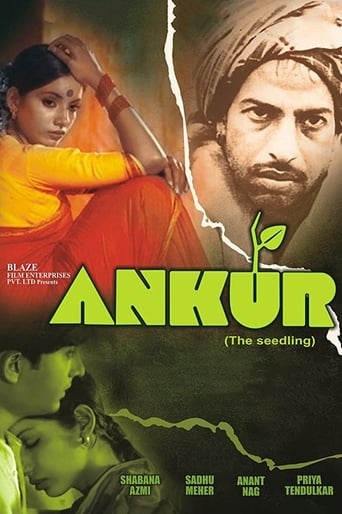



Perfectly adorable
Don't Believe the Hype
brilliant actors, brilliant editing
The movie turns out to be a little better than the average. Starting from a romantic formula often seen in the cinema, it ends in the most predictable (and somewhat bland) way.
View MoreAnkur means the Seedling. And indeed, this film was a seed to the parallel movement in films that ran in 70's and 80's. It's a wonderful depiction of the reality which existed then, and even today in some remote parts of India. The narrative is simple and indeed very slow, there are no major subplots as the main plot in itself is heart rending and superior to many films that have come till then. In an age, where superstars were being made, and Amitabh Bachhan was transformed as Angry Young Man, this film silently made its way into the public with a limited released and later on with the word of mouth. All because of many good traits that the film possesses.Shyam Benegal, who is now considered as a father of Parallel Cinema, wrote this long back and had to go to struggle to a lot to get this made. All this was done with a meager budget and the product that was obtained out of the hard work is a stand-out even today. Ankur is a pioneer and has it's moments of greatness considering the time, it was made. Subsequently, even Shyam Benegal was revered as a great film maker as many more wonderful films came from him.Now, today when I saw it, it felt a bit anachronistic and antiquated coz I do not see such kind of vulgar oppression anywhere now, may be there is but it's not reported or it's not there any more. Having said that, the emotions are universal and the feeling of being oppressed, the helplessness, the hopes that are there for well being and then a revolution being sparked. All this is put wonderfully. The last shot where a boy throws a stone at the Zamindar's house is of great symbolism and portrays a feeling that echoes with the poor who keep the poor as poor. The acting was superb, Shabana Azmi was a revelation and a blessed actor and we were grateful to have firstly and also grateful for makers to give her ample opportunities that helped her showcase her talent with an array of emotions. Thanks to Benegal to have found her and given Shabana to us. It needs applause in many areas, firstly for starting a kind of cinematic revolution in India. Yet, my only crib is the editing, I wish the film could have been slicker with sharp editing. It would have added to the pace and helped the new-age viewers like me. I am going with 4/5. It's a kind of film that's strong in social issues. But it's a laid back film that makes us recede in time. So just be warned of the pace coz it's a great film.
View MoreThe film, based on a short story by the director himself, was shot in a village somewhere near Hyderabad in Andhra Pradesh. The protagonist speaks in a 'Dakhini dialect' close to Hindi, which in the words of Shyam Benegal, was chosen to have a wider appeal across the country. The tale of exploitation of the poorer section of society by the rich landlords is seen through the predicament of Lakshmi (Shabana Azmi), a maid who falls into a trap of an illegitimate relationship with the young landlord (Anant Nag) when her husband (Sadhu Meher) forsakes her for a while and goes off elsewhere to escape the humiliation he was meted out by Anant Nag for an innocuous act of petty stealing. The scene where Meher is shaved off his hair and paraded on a donkey across the village is a depiction of rural India much as it exists in reality. Shabana Azmi excels in the dramatic sequences towards the climax. The cinematography by Gobind Nihalani is excellent, and sequences such as rain pouring on a tin roof in village houses exude charm of the rural backdrop.Rating: 3.8 out of 5
View MoreAnkur is Shyam Benegal's first movie and amongst all his gems, this is one of those his name will be most associated with. The film was a unique feature of its time - real, poetic, genuine and disturbing. It did not have the songs, the melodrama, and the exaggeration one was used to see in Hindi movies. Instead it had an unusual and gripping storyline portrayed with striking maturity and realism. This film actually established a new genre within the Hindi film industry at the time, commonly known as 'New Wave Cinema', while today people use to describe it as 'Parallel Cinema'. The film was not only special in the way it was treated, but the story itself seemed to have tackled themes which till date are categorised as social taboos in Indian cinema, whether it's adultery or sexual frustration. The film's writers use symbolism to convey the story and many interesting paradoxes and ironies.Ankur tells the story of Lakshmi, a young and serious village woman who works as a housemaid in the landlord's house and who is married to a deaf-mute man who keeps drinking. She sets on an affair with the landlord's son, Surya, who came to the village on his father's insistence to run the family business. From the very beginning of his staying there, he gets very attracted to Lakshmi. After being accused of stealing, Lakshmi's husband gets publicly humiliated by the villagers and later disappears. That's when Lakshmi and Surya's interaction grows and becomes constant. Their relationship, however, ends soon as Surya's young bride comes home. Lakshmi finds out that she is pregnant and Surya refuses to accept her, as he has also been persuaded by his wife to throw her out. A pregnant Lakshmi finds herself all alone struggling for survival, until one day her husband returns with a clear intention to make amends, very happy to find his wife's state but little knowing that he is not her child's father. Benegal's direction is outstanding. He captures the rustic, simple and raw atmosphere of the village with all its cultural customs which would seem peculiar to people not familiar with this kind of lifestyle. He just pays attention to the smallest of details, and that's what makes it so extremely realistic. Whether it's the serene narrative style, the way the proceedings are unfolded, or the way the characters are brought out on screen, all these aspects contribute to this and manage to make the film tense and thrilling. The character of Lakshmi, for instance, is presented as an extraordinary beauty amongst the many ordinary-looking people in the movie, and the viewer can really see why a bored Surya can't take his eyes off her. Ankur is very matter-of-fact in its depiction. It is brutally honest and not even once does it feel sugarcoated or unconvincing. The film's dialogues are fantastic, especially those towards the end.The brightest spot of this movie and the main reason it tugs at your heartstrings is unquestionably Shabana Azmi's powerhouse performance. Ankur is actually her first role, and it still ranks amongst the finest works of her illustrious career. Portraying her role with depth and sincerity, Azmi manages to convey a lot with just sitting silent in front of the camera. Her facial expressions, body language and line delivery are exemplary. Lakshmi draws the audience's sympathy despite being pretty unlikable. She hardly smiles once throughout the film, and looks indifferent to her surroundings, yet the viewers may really feel for her as they see her despair, her non-verbal pain and grief, her inner conflict, her daily struggles and ultimately her conscience and guilt feelings. It goes without saying that Azmi's emotional outbursts towards the end are superbly acted and moving. This one is an all-time great performance by a talent that is even greater.Apart from Azmi who owns the show from start to finish, the acting in the movie is roundly natural. Anant Nag as Surya does a very good job. Sadhu Meher is excellent as Lakshmi's helpless and loving husband. Priya Tendulkar too performs well. The last few scenes of the movie are very intense and heartbreaking. The ending is by far one of the best endings I've seen in a Hindi film - meaningful, unusual and thought-provoking - descriptions which would be perfectly used to describe the film itself. Ankur, to put it simply in just a few words, is one gem of a movie.
View MoreAnkur is to my mind one of the very best Hindi films ever made. Unusually for Hindi cinema, it is an entirely realistic film without singing and dancing. Since music is of huge commercial importance to Indian cinema, the pressure on directors to include it tends to be impossible to resist and is a constant problem facing 'serious' Indian film-makers. The late seventies was a very special moment with a concerted attempt by some directors ('New Cinema") to buck the commercial trend, of whom the most important were Shyam Benegal and Govind Nihalani (who is responsible for the cinematography in Ankur). Ankur was the first and most strikingly successful films of the "New India" movement (which only lasted some five or six years), Nihalani's Aakrosh (1980) being amongst the last. Working with a young cast (who formed a virtual repertory company for the "New Cinema" films and a committed team, Benegal was able to produce one of the freshest and most compelling of films. Without being in the least pretentious or even belonging to that nebulous category 'the art film', Ankur is a realistic drama without concession that managed also to be a significant commercial success. The acting is superb. Shabana Azmi has had a long and glorious career but has, in my view, never been better than in this, her first important role. Anant Nag (an actor who has never entirely received his due) is also as good here as I have ever seen him. Sadhu Meher (as the deaf and dumb husband) very deservedly won a national award for his performance and Priya Tedulkar is chilling as the narrow-minded malicious young wife. Nihalani's camera-work is also exceptional. In all it is one of those rare occasions when brilliant teamwork around a clearly thought-out project results in a near-perfect film.For the anecdote: There is a nice moment towards the end of the film where Surya (Anant Nag) is playing records and his wife requests something by Nimmi. Before playing the record, he corrects her by pointing out that the record is in fact by Lata. This is a very typical Benegal touch. Not only does it fix the date of the events (c. 1950) but is at once a comment on Hindi cinema history and on the character of the young wife. 1949 was the key year in establishing the absolute domination of 'playback' singers, notably Lata Mangeshkar whose annus mirabilis this was with massive hit-scores in three films, Barsaat, Mahal and Andaaz. In those days, playback singers were often uncredited and many (like the wife in the film) believed the songs to be sung by the actors and actresses themselves. The reference is particularly sardonic in a film that is itself songless. Nimmi made her début as an actress in Barsaat where she plays a simple mountain girl seduced by a cynical young man from the city and this became her typical role in subsequent films. The wife's preference for Nimmi is therefore a comment on the hypocrisy of her harsh attitude towards Lakshmi in the film.
View More